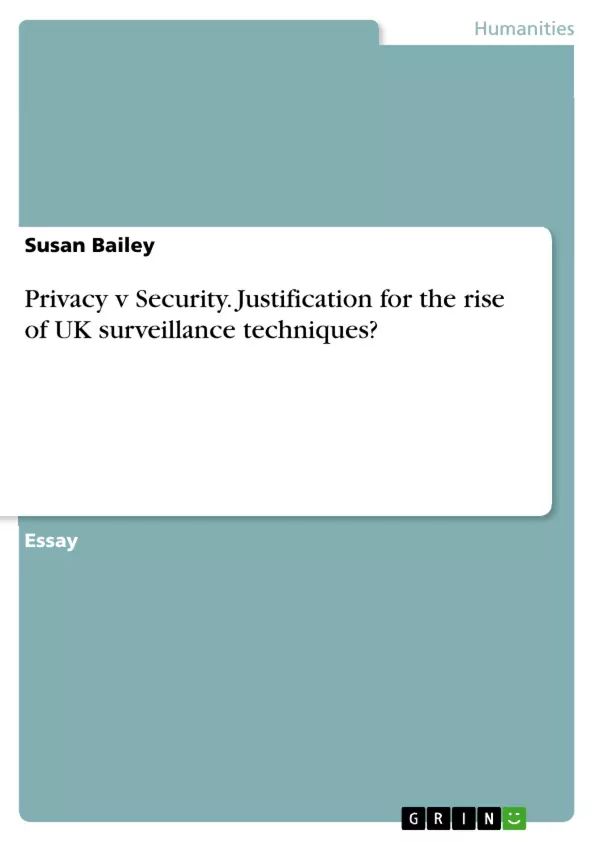Surveillance techniques are now being used to monitor the public on a global scale. It can be viewed as a grossly disproportionate, unnecessary and violating use of the government’s power, or, it can be viewed as a means of protection against crime and ‘the global war on terror’. This essay will critically discuss whether the level to which the public are watched daily is both acceptable and justified, or simply an invasion of privacy on a mass scale, using Foucault’s panoptisism theory.
Inhaltsverzeichnis (Table of Contents)
- Surveillance Techniques and the Rise of a Surveillance Society
- Foucault's Panopticism Theory
- The Impact of the Surveillance Society
- The Expansion of Surveillance in the UK
- The Role of CCTV and the Public's Acceptance
- The Rise of Mobile Surveillance
- The Justification for Surveillance
- Security and Privacy: A Necessary Trade-Off?
- The Post-9/11 World and the 'Preventative State'
- The Role of the Police Force in Surveillance
- The Regulation of Investigatory Powers Act (RIPA)
- The Effectiveness of Surveillance Techniques
- The Rise of the Risk Society
- The Culture of Insecurity and the Docility of the Public
- The Role of Politics and the Media in Shaping Perceptions
Zielsetzung und Themenschwerpunkte (Objectives and Key Themes)
This essay critically discusses the rise of surveillance techniques and its justification, particularly focusing on the UK context. It examines how the public has become increasingly accustomed to and accepting of surveillance, questioning the balance between security and privacy.
- The evolution of surveillance techniques and their impact on society
- The relationship between power, knowledge, and surveillance
- The role of Foucault's panopticism theory in understanding contemporary surveillance
- The impact of the 'war on terror' on surveillance practices
- The public's perception of and acceptance of surveillance
Zusammenfassung der Kapitel (Chapter Summaries)
- Surveillance Techniques and the Rise of a Surveillance Society: This section introduces the concept of a surveillance society and critically examines the justification for the growing use of surveillance techniques. It explores Foucault's panopticism theory and its application to contemporary surveillance, highlighting the impact of the all-seeing gaze on individuals' behavior and identity.
- The Expansion of Surveillance in the UK: This section delves into the specific examples of surveillance practices in the UK, including the widespread use of CCTV cameras, mobile phone tracking, and the collection of personal information. It explores the role of the media in shaping public perception and acceptance of surveillance.
- The Justification for Surveillance: This section examines the arguments for and against surveillance, focusing on the perceived need for security versus the protection of individual privacy. It explores the impact of events like the 9/11 terrorist attacks and the rise of the 'preventative state' on public attitudes toward surveillance.
- The Role of the Police Force in Surveillance: This section discusses the specific role of the police force in surveillance practices, including the powers granted under the Regulation of Investigatory Powers Act (RIPA). It explores the effectiveness of surveillance in combating crime and terrorism, while also considering criticisms of the lack of public consent and regulation.
- The Rise of the Risk Society: This section examines the broader cultural shift towards a risk society, where individuals are increasingly aware of and concerned about potential threats. It explores the role of the media in fueling this sense of insecurity and the resulting willingness of the public to accept surveillance as a means of protection.
Schlüsselwörter (Keywords)
Key themes and concepts explored in this essay include surveillance, panopticism, security, privacy, risk society, 'docile bodies', the 'war on terror', the preventative state, public perception, and the role of the media.
- Quote paper
- Susan Bailey (Author), 2017, Privacy v Security. Justification for the rise of UK surveillance techniques?, Munich, GRIN Verlag, https://www.hausarbeiten.de/document/373708


